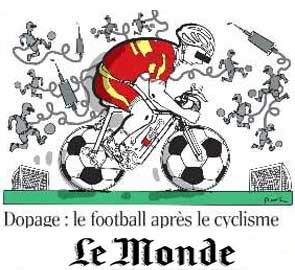CLASS 46
Now in its twelfth year, Class 46 is dedicated to European trade mark law and practice. This weblog is written by a team of enthusiasts who want to spread the word and share their thoughts with others.
Who we all are...
FRIDAY, 4 APRIL 2014
Spain: The Honorability of Trademarks
Personality and trademark rights follow different
paths but converge when discrediting comes into play. Whereas honorability is
connected to a person's name, goodwill is linked to a trademark or trade name.
If the name and trademark or trade name coincide, the same discrediting conduct
may duplicate its negative effects, affecting both personality and trademark
rights at the same time. A recent Supreme Court (Civil Chamber) decision handed
down on 24 February 2014 (Real Madrid Club de Fútbol and Mr. Evelio;
"Real Madrid" v. Le Monde and Mr. Luis Enrique; "Le Monde"),
is illustrative on the side of personality rights.
After eight years of litigation, Real Madrid has won
the legal battle over Le Monde regarding the article published on 7 December
2006 by the French newspaper. According to the article, Real Madrid, its
medical team and a few of its players were allegedly involved in a massive
doping case called Operación Puerto, in which the central character, a certain
Dr. Eufemiano Fuentes, was finally sentenced to one and a half years of
imprisonment. The Court considered that Le Monde did not carry out a proper due
diligence over its sources and materials prior to the publication of the story,
which was considered to have been written
precipitously. Furthermore, the Court ruled that the testimonies and the evidence
provided in the proceedings lacked any reliable basis. Le Monde is now ordered
to compensate Real Madrid with up to €300,000 and to publish the decision in Le
Monde and in the Spanish sports newspaper Marca.

The Supreme Court provides useful criteria in order to
assess how to balance the personality rights affecting one's reputation with respect to the right to freedom of
expression. These can be summarized as follows:
- The fundamental right to honor protects one's personal
reputation, which is understood as the appreciation others may have of a person.
This right protects against insulting messages or expressions that may
objectively discredit one's personal reputation.
- One's personal reputation also covers professional
reputation, but not every attack to someone's professional reputation affects his
or her personal reputation. For this to occur, the attack must be particularly
intense, affecting not only the economic side of the professional or commercial
activity, but also the personal sphere. Questioning someone's ethics, honesty
or integrity in carrying out professional tasks may affect his or her personal
rights.
- The freedom of expression does have more weight when
the information is of public or general interest.
- Contrary to freedom of speech, the freedom of
expression, when it comes to communicating news that may affect the reputation of
a third party, is specially conditioned to the veracity of what is said.
- Veracity is not an absolute requirement: what is necessary
is a reasonable due diligence approach to veracity in the particular
circumstances, in order to respect the public right to information. Therefore,
the following considerations must be taken into account: this due diligence
must be of special intensity when the information might negatively affect the
reputation of a third person; the presumption of innocence must be respected;
general or public interest requires a more exhaustive contrasting of the facts;
private individuals as opposed to public individuals have greater privacy; the subject
matter of the information is relevant, since it is not the same to present
information as one's own information than to transmit it neutrally; typology of
sources and actual chances to contrast the information, etc.
- Arguably, there is not a right to insult. Therefore,
depicting the information with a libelous or disproportionate manner is not
legitimate.
- In order to prosecute an infringement to one's honor,
the information must provide data so that the individual or company is easily
identifiable. The subjective impression of being the target of the information
does not make the information eligible for being prosecuted.

All
these criteria were taken into account by the Supreme Court when it examined
the Real Madrid claim. They were also taken into account in a previous decision
of 7 November 2011 concerning the same newspaper and the same information, but
regarding Fútbol Club Barcelona. Damages in this latter case were substantially
lower, as the court calculated that the damages to the Catalan club amounted to
only €15,000, as opposed to €300,000 in the Real Madrid case. The difference
was based on the evidence submitted; furthermore, Fútbol Club Barcelona did not
appeal that point of the decision to the Supreme Court.
Posted by: Fidel Porcuna @ 12.20
Tags:
Real Madrid Goodwill Honor ,


 Sharing on Social Media? Use the link below...
Sharing on Social Media? Use the link below...
Perm-A-Link: https://www.marques.org/blogs/class46?XID=BHA3666
Reader Comments: 0
Post a Comment
MARQUES does not guarantee the accuracy of the information in this blog. The views are those of the individual contributors and do not necessarily reflect those of MARQUES. Seek professional advice before action on any information included here.
The Class 46 Archive


 Sharing on Social Media? Use the link below...
Sharing on Social Media? Use the link below...
